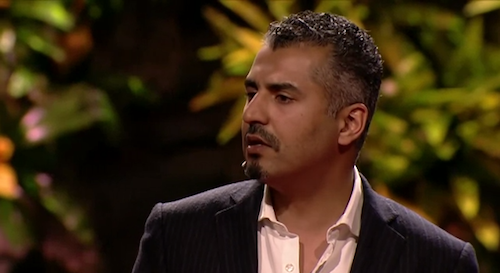Notes from a Former Jihadist
by Bina Shah / June 26, 2012 / No comments
As a teenager Maajid Nawaz was a radical Islamist. Now he champions democracy.
Co-founder of both the Quilliam Foundation in the UK and Khudi, an NGO in Pakistan, Maajid Nawaz is a British Pakistani in his mid-thirties. His hair is grey but his cheeks are still full, which makes him look old and young at the same time. He’s intense and well-spoken, with degrees from the London School of Economics and the School of Oriental and African Studies at the University of London. He is also fluent in Arabic, although his Urdu is weak, he admits with a laugh.

- Pakistan is a country of contradictions – full of promise for growth, modernity and progress, yet shrouded by political, social and cultural issues that undermine its quest for identity and integrity. My bi-monthly column “Pakistan Unveiled” presents stories that showcase the Pakistani struggle for freedom of expression, an end to censorship, and a more open and balanced society.

- Bina Shah is a Karachi-based journalist and fiction writer and has taught writing at the university level. She is the author of four novels and two collections of short stories. She is a columnist for two major English-language newspapers in Pakistan, The Dawn and The Express Tribune, and she has contributed to international newspapers including The Independent, The Guardian, and The International Herald Tribune. She is an alumnus of the International Writers Workshop (IWP 2011).
Born and raised in Essex, Nawaz joined the Islamist group Hizb ul Tahrir at the age of 16 and came to Pakistan with the intention of recruiting people from universities and the military for the Islamist cause. His mission was to hijack the intellectual life and military of Pakistan in order to bring about a coup that would enable the Islamists to impose their interpretation of Islam on Pakistani society.
When he went to Egypt to do the same thing, he was captured by state security and put in Cairo’s dungeons for five years. He was tortured—the preferred method being to pin people down with a chair and attach electrodes to their teeth and genitalia—but he was also adopted as an Amnesty International prisoner of conscience. Then, alongside former members of Hizb ul Tahrir and other Islamist groups, Nawaz studied Islam with scholars from Al-Azhar University who taught him to look at the original sources.
These two events re-humanized Nawaz and made him change his mind about Islamism, causing him to refute its violence and ideology. When he got out of jail, Nawaz waited a year to test his new theories against the foundations of his group. When he found them wanting, he left Hizb ul Tahrir.
Now Nawaz devotes his life to undoing the damage he did as a radical Islamist, spreading the message that Islam is not the same thing as Islamism, that Islam is a faith, not a political religion or an ideology. His organization Khudi holds workshops all around Pakistan to teach people about democratic values: Human rights, gender rights, freedom of expression, and freedom of belief.
Nawaz believes that democracy has received a bad name and needs re-branding. The way to discourage young people from the path of extremism is to use the same methods he once used to recruit them to that path. But this time the goal is to recruit them to a democratic youth movement, to engage and activate civil society—a “tabligh” for democracy—a cheeky hijacking of the word used to describe the work of Islamist missionaries in propagating Islamism.
Nawaz also praises the 2008 Pakistan lawyers’ movement, in which lawyers protested the removal of the Chief Justice of the Supreme Court by then President Pervez Musharraf, which eventually led to Musharraf’s resignation. This, Nawaz says, was the precursor to the Arab Spring; Pakistan didn’t need a revolution because it already accomplished its goal of ushering in a new era of democracy (albeit a rather dysfunctional one).
The Quilliam Foundation in the UK has come under fire for being funded by the British government and for its links to neoconservative groups. It has also been involved with “domestic spying” on Muslims in the UK, throwing its credibility into doubt amongst the very population it intends to target. This also highlights the question whether anti-extremist movements should be supported in general even if they disregard civil liberties. Given his past life and the questions surrounding his current incarnation, Majid Nawaz will have to work hard to convince Pakistanis of his trustworthiness, as well as the purity and intentions of his message.





